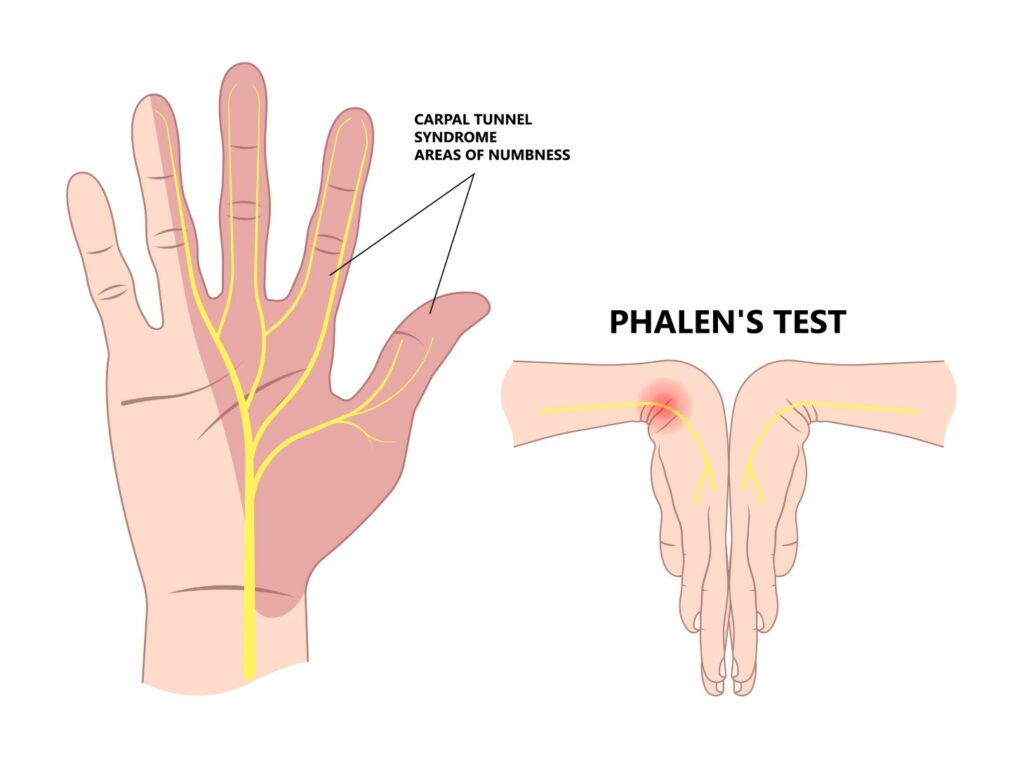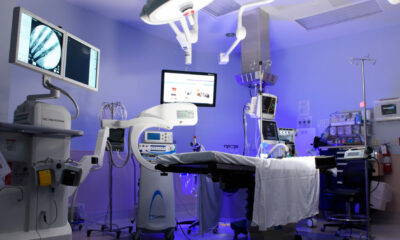Access your own patient portal, provided by NCSH.
Hand & Wrist
How to Perform a Carpal Tunnel Syndrome Test
Thu, Jan 11, 2024

Carpal tunnel syndrome (CTS) is a painful, even debilitating condition of the wrist, hand, and arm. It can make basic tasks nearly impossible. You can do some carpal tunnel tests at home, but it’s best to see an orthopedic specialist if symptoms recur. They can provide a confirmed diagnosis and both nonsurgical and surgical treatment options.
What Is Carpal Tunnel Syndrome?
Carpal tunnel syndrome is a condition resulting from compression of the median nerve that runs from the forearm into the palm of the hand. The carpal tunnel is the space in the wrist through which the nerve runs. Pressure of the tunnel on the nerve can result in painful and uncomfortable symptoms.
CTS is typically caused by multiple factors. Repetitive motion is a common trigger. Using a computer, hand tools, or vibrating power tools are examples of activities that can contribute to CTS over time. Other risk factors include arthritis, wrist injuries, a cyst in the carpal tunnel, and being older and female.
How Do I Know If I Have Carpal Tunnel Syndrome?
The first clues that you might have CTS are having risk factors and experiencing common symptoms, which tend to set in gradually and come and go. Over time, they get worse and occur more frequently. Symptoms of carpal tunnel syndrome include:
Pain
Pain is a common symptom of CTS. It often feels like an ache on the inside of the wrist and up the inside of the forearm. The pain may also travel along the palm of the hand and into the fingers, primarily the thumb, index finger, and middle finger. Pain is often worse at night.
Numbness and Tingling
Also common is a numb or tingling sensation in the hands and especially in the thumb and index and middle fingers. You might find that your hands fall asleep easily, resulting in weakness and losing your grip on objects.
You probably experience this issue more often with certain activities that involve grasping things, like holding a pencil, buttoning a shirt, or holding the steering wheel when driving. You might drop things more than usual or be unable to do some tasks that require a firm grip.
Other Symptoms
Pain, numbness, tingling, and weakness are the most common symptoms of CTS. You might also experience a swollen sensation in your hands, even if they don’t appear swollen. Rarely, patients with CTS report a greater sensitivity to cold temperatures.
Testing for Carpal Tunnel Syndrome at Home
 If you have the characteristic symptoms, some simple home tests can give you a better idea of whether you have CTS:
If you have the characteristic symptoms, some simple home tests can give you a better idea of whether you have CTS:
- Range of motion. If you have CTS, you likely have a reduced range of motion in the wrist when flexing and extending it. You might notice this or compare it to the other wrist if you have symptoms in only one hand.
- Phalen’s test. Perform this test by pressing the backs of your hands together with your forearms upright and your fingers pointing down. Your wrists should be as flexed as possible. With CTS, this should cause a flare of symptoms.
- Tinel’s test. CTS should also cause pain or tingling when you press or tap on the median nerve. It is on the inside of the wrist, just below the palm.
How Doctors Test for Carpal Tunnel Syndrome and Make a Diagnosis
To diagnose CTS, a doctor will go over your symptoms and perform the manual tests described above. If they suspect CTS, they can use more specific clinical tests to confirm a diagnosis or determine another cause of symptoms.
Electromyographical (EMG) tests use small electrical shocks applied to the arm, wrist, and hand. By measuring the speed at which they travel through the nerve, a doctor can determine if it is being compressed. Compression should slow down the electrical impulse.
When to See a Specialist for Carpal Tunnel Syndrome
The best way to confirm or rule out CTS is to see an orthopedic hand and wrist specialist. Symptoms will only get worse over time. Delaying treatment can cause muscle and nerve damage that may not be reversible.
If you have recurring symptoms characteristic of CTS and have positive reactions to the self-tests, it’s time to see a specialist. The hand and wrist experts at North Carolina Specialty Hospital can diagnose you and offer treatment options. Learn more and make an appointment.
RELATED NEWS

Your Tennis Elbow Surgery Questions Answered
Tennis elbow is a repetitive motion injury of forearm muscles and the tendons that connect those muscles to the outside of the elbow. Also known as lateral epicondylitis, tennis elbow mainly causes pain on the…
Continue Reading

Secrets to Sleeping with Tennis Elbow
Despite the name, tennis elbow doesn’t happen only to tennis players. It is a fairly common joint injury, occurring in between 1% and 3% of the population and resulting from overuse. Irritation and pain in…
Continue Reading
Stay Current
Educational Articles & More
View News & Press